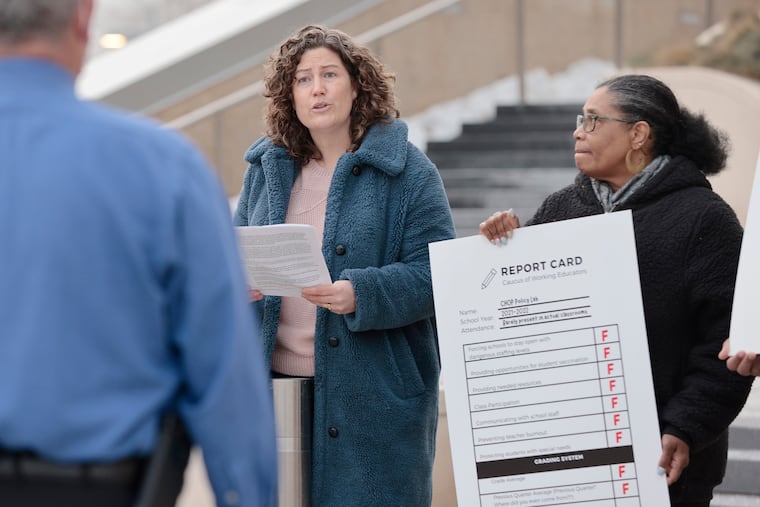Some Philly teachers protest CHOP’s PolicyLab guidelines, saying they are not rooted in reality
Jessica Way, a teacher at Franklin Learning Center and registered nurse, asked how guidelines could have been drawn without seeing whether they would be feasible for the district’s 250,000 students.

A group of Philadelphia teachers gathered outside Children’s Hospital of Philadelphia on Wednesday to decry CHOP PolicyLab’s COVID-19 school guidance, which they say endangers city children.
With an eye toward keeping schools open even as coronavirus cases surged, PolicyLab last month issued new guidance that recommended districts drop quarantine lengths and asymptomatic testing if they were able to keep other mitigation measures, like masking and adequate ventilation, in place.
» READ MORE: Some COVID-19 recommendations are no longer ‘feasible or practical’ for schools, CHOP says
At the same time, the district, with the Philadelphia Department of Public Health’s blessing, has said it will stop shutting schools for in-person instruction when case counts are high. Schools will only shift to virtual instruction if staffing levels prevent in-person school from occurring safely. Soon after winter break, more than 100 Philadelphia schools were forced to go remote because of high numbers of staff COVID-19 cases and quarantines.
The nine teachers, who waved giant report cards outside CHOP’s Roberts Center, said the CHOP guidance is not rooted in the reality of Philadelphia schools — many of which operate in old buildings with poor ventilation and are attended by students who sometimes don’t comply with mask guidance.
Jessica Way, a teacher at Franklin Learning Center and registered nurse, asked how any guidelines could have been drawn without seeing whether they would be feasible for the district’s 250,000 students.
“Why would you even create a document without first coming and talking to the staff of these schools and seeing how difficult it would be to implement?” she asked.
According to a statement from CHOP PolicyLab responding to concerns from the Caucus of Working Educators, an activist group within the Philadelphia Federation of Teachers, the guidelines, which prioritize vaccination and mask-wearing over testing and quarantines, were not intended to dictate a one-size-fits-all solution.
They illustrate how current data might inform school policy, and “from there, it remains the responsibility of school leaders working with local health authorities to determine how this guidance might influence their school safety plans.”
» READ MORE: Masks are still a part of new COVID-19 guidelines for schools. But some around Philly aren’t requiring them.
The district has not uniformly adopted CHOP guidance; PolicyLab, like the CDC, recommended decreasing quarantine times for COVID-19-positive individuals from 10 to five days, but the district, in consultation with the city’s health department, is sticking with the 10-day quarantine. The district is still performing asymptomatic testing on all staff, though it is not testing students.
Roman Krivitsky, a teacher at Dobbins High School, though, worries about the high percentage of Philadelphia students who remain unvaccinated, and the fact that students are eating indoor lunch.
“Plus, the district basically has no masking policy, and they pretend they have a mask policy now,” said Krivitsky.
The school system has said it would crack down on mask compliance after the winter break, sending home staff and students who refuse to wear masks properly, but that has largely not happened, teachers say.
“People don’t respect teachers enough to listen to them,” Way said. “It’s time to listen to our concerns.”
Staff photographer Elizabeth Robertson contributed to this article.